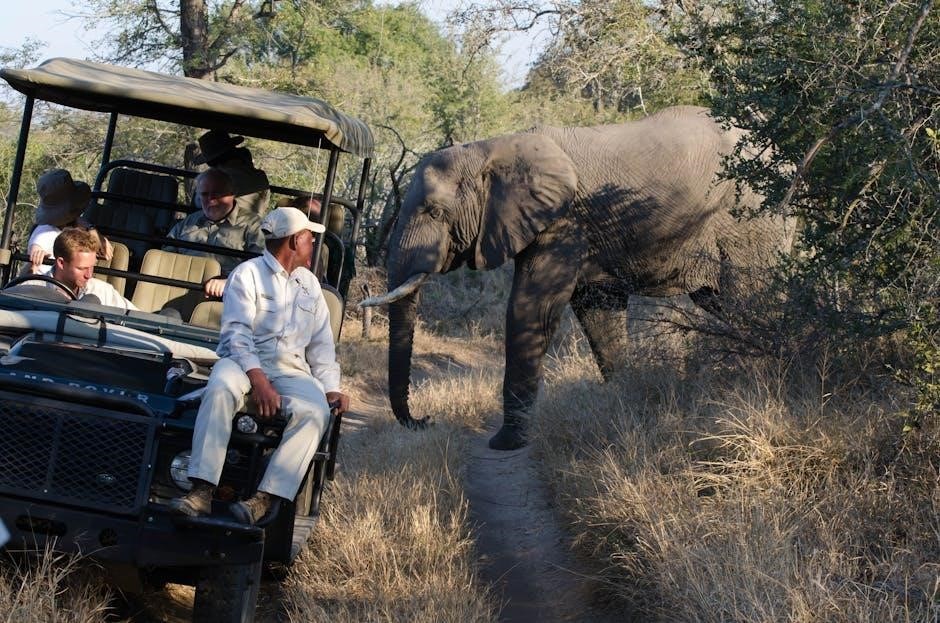
and knowledge of wildlife conservation, to become a successful guide in the industry with a
passion for nature
.
Overview of the Profession
The safari tour guide profession is a unique and exciting career that involves leading groups of people on tours and expeditions through wildlife reserves and national parks.
As a safari tour guide, one is responsible for ensuring the safety and enjoyment of tourists while also providing them with information and insights about the wildlife and ecosystem they are visiting.
This profession requires a deep passion for nature and wildlife, as well as excellent communication and leadership skills.
Safari tour guides must be knowledgeable about the flora and fauna of the area they are operating in, and be able to identify and explain the different species of plants and animals that tourists encounter.
They must also be able to navigate the terrain and operate vehicles safely, and be prepared to handle emergencies and unexpected situations that may arise during a tour.
Overall, the safari tour guide profession is a rewarding and challenging career that offers the opportunity to work in beautiful and remote locations, and to share one’s knowledge and love of nature with others.
The profession is also constantly evolving, with new technologies and techniques being developed to improve the safety and quality of safari tours.
Benefits of the Profession
The benefits of being a safari tour guide are numerous and varied, offering a unique and rewarding career.
One of the main benefits is the opportunity to work in beautiful and remote locations, surrounded by stunning natural scenery and wildlife.
Safari tour guides also have the chance to meet and interact with people from all over the world, sharing their knowledge and passion for nature with others.
In addition, the profession offers a sense of freedom and adventure, with each tour presenting new and exciting challenges and experiences.

Safari tour guides are also able to develop a deep understanding and appreciation of the natural world, and play a role in conservation efforts and promoting sustainability.
Furthermore, the profession offers opportunities for personal growth and development, with guides able to continuously learn and improve their skills and knowledge.
Overall, the benefits of being a safari tour guide make it a highly rewarding and sought-after career, offering a unique combination of adventure, personal growth, and opportunities to make a positive impact on the world.
This career path is ideal for those who are passionate about nature and the outdoors.

Education and Training Requirements
Typically requires a high school diploma or equivalent with
extensive knowledge
of wildlife and conservation to succeed.
Formal Education
A safari tour guide typically requires a high school diploma or equivalent, with many guides also holding degrees in fields such as wildlife conservation, zoology, or environmental science.
These educational backgrounds provide a solid foundation for understanding the complex relationships between different species and their habitats, as well as the impact of human activity on the environment.
Additionally, formal education can help guides develop important skills such as communication, problem-solving, and leadership, which are essential for leading safe and successful tours.
Some guides may also choose to pursue higher-level degrees, such as master’s or doctoral degrees, in order to specialize in a particular area of expertise or to advance their careers.
Overall, formal education plays an important role in preparing individuals for a career as a safari tour guide, and can help them develop the knowledge, skills, and expertise needed to succeed in this field.
By combining formal education with practical experience and training, aspiring guides can gain the skills and confidence they need to lead exciting and educational tours.
Professional Certifications
Professional certifications are an important aspect of a safari tour guide’s career, as they demonstrate a level of expertise and competence in the field.
One such certification is the FGASA Level 1 professional field guiding qualification, which is recognized industry-wide and requires completion of a comprehensive training program.
Another certification is the CATHSSETA Nature Site Guide NQF2 qualification, which is specific to South Africa and requires guides to have a thorough knowledge of the country’s flora, fauna, and terrain.
These certifications are often obtained through specialized training programs, which may include both theoretical and practical components.
By obtaining professional certifications, safari tour guides can demonstrate their commitment to their profession and enhance their career prospects.
Additionally, certifications can also provide guides with a competitive edge in the industry, as they are recognized by tour operators and other stakeholders as a mark of excellence.
Overall, professional certifications play a crucial role in the career development of safari tour guides, and are an essential component of their professional development.

Training and Certification Programs
Comprehensive programs offer specialized training and certification for safari tour guides, enhancing their skills and knowledge in a
variety of areas
.

Comprehensive Training Courses
Comprehensive training courses for safari tour guides are designed to provide students with a thorough understanding of the skills and knowledge required to become a successful guide. These courses typically include a combination of theoretical and practical training, covering topics such as wildlife conservation, ecology, and tourism management. Students can expect to learn about the different types of wildlife and their habitats, as well as how to identify and track animals. They will also learn about the importance of safety and risk management, and how to handle emergency situations. Additionally, courses may include training on communication and leadership skills, as well as how to provide excellent customer service. Overall, comprehensive training courses provide students with the foundation they need to succeed as a safari tour guide and to provide their clients with a safe and enjoyable experience. With the right training, guides can develop the skills and confidence they need to lead successful safaris.
Optional Placement Programs
Optional placement programs for safari tour guides provide students with the opportunity to gain practical experience in the field. These programs typically involve a placement with a reputable safari company or lodge, where students can work alongside experienced guides and gain hands-on experience. The placement program can last for several months, during which time students will be able to develop their skills and build their confidence as a guide. Students will have the opportunity to lead safaris, interact with clients, and learn from experienced guides. The placement program is a valuable component of the training, as it provides students with the chance to apply their knowledge and skills in a real-world setting. By participating in an optional placement program, students can gain the experience and skills they need to succeed as a safari tour guide. The program is designed to be flexible, allowing students to choose the length and type of placement that suits their needs and goals. This experience is invaluable in preparing students for a successful career as a safari tour guide.